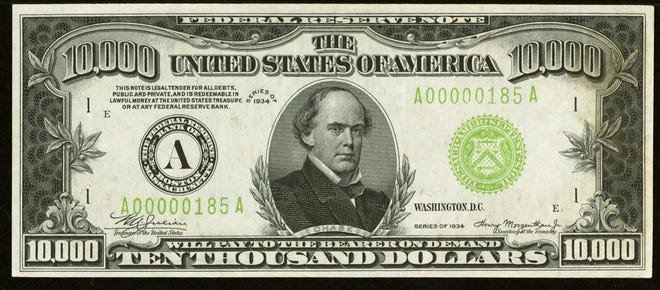

Currency worth $10,000 is already impressive enough – it’s a much larger sum than most people will hold in their hands at once in a lifetime.
A rare $10,000 bank reserve note dating back to 1934, however, turned out to be worth even more when it sold at auction this month; $470,000 more, to be exact.
The Great Depression-era bill sold in Dallas at the Long Beach Expo US Coins Signature Auction hosted by Heritage Auctions. It features a portrait not of a president, like most of our money today, but President Lincoln’s Secretary of the Treasury, Salmon P. Chase.
According to the Museum of American Finance, the $10,000 mark was the highest denomination ever publicly circulated in the U.S., as the larger $100,000 note that existed at one point was only used for transfers between Federal Reserve Banks and was not available to consumers.
Bob Ross painting selling for millions:Bob Ross’ 1st painting from famed TV show up for auction. How much is it?
An ‘absolute prize’
The bill was graded by the Paper Money Guaranty (PMG), a third-party organization specializing in assessing and certifying paper money, and was found to be in the highest-grade condition, according to a Heritage Auctions press release. This specific example never circulated after being minted, which may account for its pristine condition.
With so few of the bills still existing, this made it an “absolute prize,” said Dustin Johnston, Vice President of Currency at Heritage Auctions.
“Large-denomination notes always have drawn the interest of collectors of all levels,” Johnston said in the press release. “The $10,000 trails only the $100,000 gold certificate issued in 1934, and of the 18 examples graded by PMG, this example is tied for the highest-graded.”

Goodwill find worth thousands:‘A perfect match’: Alabama nursing student buys $6,000 designer wedding dress for $25 at Goodwill
Today, the largest denomination in American currency is the $100 bill. In the past, $500, $1,000, $5,000 and $10,000 notes were in circulation, but most people weren’t walking around paying for groceries with multi-thousands dollar bills, prompting the government to stop the production of those larger than $100 in 1969.
Though the larger bills were still issued until 1969, they stopped being printed in 1945, according to The Bureau of Engraving & Printing.
While the $480,000 sale was the star of the show, other items also sold for thousands during the expo, including an 1899 twenty-dollar coin for $468,000 and a $5,000 note for $300,000.
By the end of the weekend, the auction event pulled in a total of $15,545,589.





